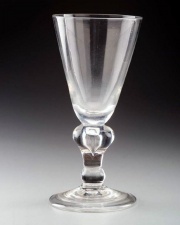Difference between revisions of "Lead glass"
Jump to navigation
Jump to search
(username removed) |
|||
| (2 intermediate revisions by 2 users not shown) | |||
| Line 1: | Line 1: | ||
| − | [[File:65.2327-SC48254.jpg|thumb|]] | + | [[File:65.2327-SC48254.jpg|thumb|Goblet<br>MFA# 65.2327]] |
== Description == | == Description == | ||
| − | Glass containing [ | + | Glass containing [[lead tetroxide|lead oxide]] as one of its ingredients. Lead oxide acts as both a flux and a stabilizer typically replacing some of the calcium in a [[potash glass]]. Lead glass contains about 18–35 mol% PbO, compared to modern [[crystal glass|lead crystal]] that contains a minimum of 24% lead oxide. The addition of lead oxide to glass increases the [[refractive index]] (from about 1.5 to 1.7) giving the glass its optical brilliance. The earliest known example of lead glass is a blue glass fragment from Nippur dated to 1400 BC containing 3.66% PbO. |
| − | See also [ | + | See also [[potash-lead glass]] and [[leaded glass]]. |
== Synonyms and Related Terms == | == Synonyms and Related Terms == | ||
Latest revision as of 16:03, 25 August 2020
Description
Glass containing lead oxide as one of its ingredients. Lead oxide acts as both a flux and a stabilizer typically replacing some of the calcium in a Potash glass. Lead glass contains about 18–35 mol% PbO, compared to modern lead crystal that contains a minimum of 24% lead oxide. The addition of lead oxide to glass increases the Refractive index (from about 1.5 to 1.7) giving the glass its optical brilliance. The earliest known example of lead glass is a blue glass fragment from Nippur dated to 1400 BC containing 3.66% PbO.
See also Potash-lead glass and Leaded glass.
Synonyms and Related Terms
litharge glass; verre au plomb (Fr.); vetro al piombo (It.); loodglas (Ned.); vidro de chumbo (Port.)
